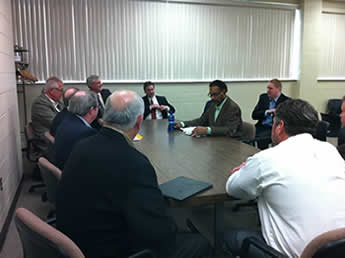More Than Talk
Missouri's Fifth District is what I like to call a microcosm of our country. Our urban and rural communities depend on and derive strength from one another in a symbiotic, beneficial relationship. We have a vibrant city center so cool that the Huffington Post named it the coolest city in America. We have abundant farmland where our farmers grow soybeans and corn, and ranchers tend livestock. We have beautiful and welcoming suburbs where families flourish. Everywhere around the district— Kansas City, Independence, Lee's Summit, Raytown, Grandview, Sugar Creek, Blue Springs, Grain Valley, Oak Grove, North Kansas City, Gladstone, Claycomo, and all of Ray, Lafayette, and Saline Counties—has something to make it great.
Representing my district is a responsibility I take very seriously. Our differences can make us unique and strong. I believe we can have more in common than in conflict. The problems that divide us are of our own making. The solutions that could unite us are ripe for the taking.
This sounds like a lot of talk. I promise you, it is more than that. Let me share with you an example.
After we faced the worst financial crisis since the Great Depression, Congress enacted the Dodd-Frank Wall Street Reform and Consumer Protection Act into law. I believe this law goes a long way toward restoring responsibility and accountability in our financial system. It gives Missourians and Americans confidence that there is a strong system in place that works for and protects us. I voted for it. I support it. I want to protect it. But I have watched the way it has been implemented, and when and where I have taken issue with it, I have taken initiative.
Let me state the obvious: the community bank down the street from you did not cause the stock market to crash. Community banks did not cause our financial crisis, and we shouldn't ask them to pay the penalty. There is something called the Qualified Mortgage or Ability-to-Repay Rule that I have mentioned to you before. It is complicated, but it basically means that a bank can't make a mortgage loan without seeing if a consumer can pay that loan back. It's common sense, and it's a good idea. But an idea must work in the real world to be worth its salt.
|
This rule treated my constituents in rural areas as mere suburbs of Kansas City. Now, I believe we have much in common as communities. But at times our needs differ. Our paths can diverge. After I met with rural bankers from Lafayette and Saline Counties in April of 2013, I wrote to Director Cordray, saying we should change the rule. He listened. And so did the CFPB. This week, they announced changes. Ultimately, we must keep working with consumers, lenders, and regulators to make sure consumers get a fair shake. We must help banks work with families buying their first home. We must allow entrepreneurs to access capital responsibly. And we must keep our financial system safe and secure.
Let me share one more note with you before I go. I recently did an interview with the National Journal about these very issues. You may be interested in reading it:
As a former mayor of Kansas City who went on to represent that congressional district in 2005, Cleaver had a reputation as an "urban politician." He wanted to make sure his new constituents felt they had a voice and that they could rely on him to be an advocate for farmers as well as for city- and suburb-dwellers. He set up roundtable meetings for his constituents with both EPA Administrator Gina McCarthy and Agriculture Secretary Tom Vilsack, who met with farmers and other constituents in small Missouri towns, Oak Grove and Odessa, respectively. |
